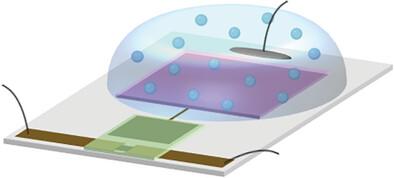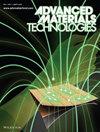Selective and Real‐Time Ion Monitoring with Integrated Floating‐Gate Organic Electrochemical Transistor Sensing Circuits
IF 6.4
3区 材料科学
Q1 MATERIALS SCIENCE, MULTIDISCIPLINARY
引用次数: 0
Abstract
Ion‐selective transistor‐based sensors play a pivotal role in quantifying ion concentrations in aqueous media. Existing solutions rely on direct coupling between ion‐selective membrane and channel, requiring bulky electrolyte reservoirs or complex technological approaches and material interfaces. This work introduces a transformative paradigm with ion‐selective floating‐gate organic electrochemical transistors (ISFG‐OECTs) and their integration in sensing circuits. ISFG‐OECTs feature spatial separation between ion‐selective gating and ionic‐electronic current modulation. Leveraging volumetric capacitance and solid‐state ionic liquid, efficient ionic coupling with the channel is obtained. These distinctive features make them an ideal solution for streamlined materials integration, eliminating the need for liquid reservoirs. Theoretical foundations and design guidelines for efficient ISFG‐OECT implementation are elucidated. Experimental results demonstrate the effectiveness of ISFG‐OECTs in both transistor‐sensors and current‐driven circuit configurations, revealing highly selective detection of K+ ions with a limit of detection as low as 11 × 10−6 m, even in the presence of interfering Na+ ions at concentrations two orders of magnitude higher. The proposed approach is simple, reliable, and scalable, offering opportunities for a broad range of fields, such as medical diagnostics, precision agriculture, and environmental monitoring.

利用集成浮动栅有机电化学晶体管传感电路进行选择性实时离子监测
基于离子选择晶体管的传感器在量化水介质中的离子浓度方面发挥着举足轻重的作用。现有的解决方案依赖于离子选择膜和通道之间的直接耦合,需要笨重的电解质容器或复杂的技术方法和材料界面。这项研究引入了离子选择浮动栅有机电化学晶体管(ISFG-OECTs)及其与传感电路的集成这一变革性范例。ISFG-OECTs 的特点是离子选择门控和离子电子电流调制之间的空间分离。利用体积电容和固态离子液体,可实现与通道的高效离子耦合。这些显著特点使它们成为简化材料集成的理想解决方案,无需使用储液器。本文阐明了高效实现 ISFG-OECT 的理论基础和设计指南。实验结果证明了 ISFG-OECTs 在晶体管传感器和电流驱动电路配置中的有效性,揭示了对 K+ 离子的高选择性检测,检测限低至 11 × 10-6 m,即使存在浓度高出两个数量级的 Na+ 离子干扰。所提出的方法简单、可靠、可扩展,为医疗诊断、精准农业和环境监测等广泛领域提供了机会。
本文章由计算机程序翻译,如有差异,请以英文原文为准。
求助全文
约1分钟内获得全文
求助全文
来源期刊

Advanced Materials Technologies
Materials Science-General Materials Science
CiteScore
10.20
自引率
4.40%
发文量
566
期刊介绍:
Advanced Materials Technologies Advanced Materials Technologies is the new home for all technology-related materials applications research, with particular focus on advanced device design, fabrication and integration, as well as new technologies based on novel materials. It bridges the gap between fundamental laboratory research and industry.
文献相关原料
| 公司名称 | 产品信息 | 采购帮参考价格 |
|---|
 求助内容:
求助内容: 应助结果提醒方式:
应助结果提醒方式:


